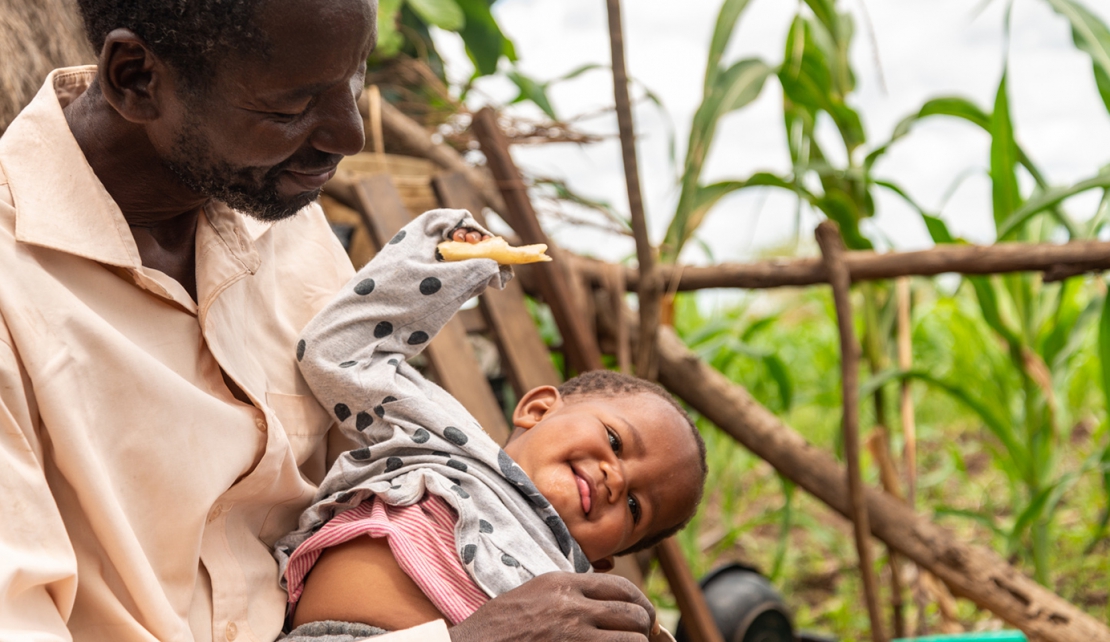The green maize field surrounding Wambura Mwinga’s house tells a story of abundance. Yet as you step into their compound and see inside the bare, ramshackle wooden shed being held up with poles, it reveals the reality. This falling-down shed is where Wambura stores his harvest. Just four months after he and his wife Robi harvested their maize field, they are already down to their last scoop of maize flour.
“The harvest that we got was little. We did not get enough to sell and without money, we could not buy cooking oil or change our daily meal. Every day we ate ugali and some vegetables that I picked from the garden. Before we cooked ugali, we would scoop a cup of porridge for baby Bhoke,” said Robi.
Though they plant the fields twice a year, the harvest remains slim. Confused, Wambura says, “I don’t know why I don’t get food anymore.” Every year, the couple follows the same routine. They pick up their plowing hoes, maize seeds, and go to their farm, hoping their efforts will produce a better harvest than the previous year.
But life has changed in Tarime, northwestern Tanzania. Warumba now has to deal with the lack of rain and the abundance of pests and diseases that are becoming immune to his traditional treatment methods.
It would be a long time before the maize growing in their farm is ready for harvest again. As they waited, Wambura was forced to find another way to provide for his family. His daughter Bhoke was two months old, and since she was born, his wife had not been able to produce milk.
Every day, Wambura would leave home and go to a nearby forest where he would cut firewood and give it to his wife to sell. With little Bhoke strapped to her, Robi walked to the market. She was hungry, and her daughter was too weak to even cry.
The pile of firewood sells for just Tshs 1,500 (US $0.65). It is not much money, but Robi can buy some milk for her daughter's porridge. At the shop where she was buying milk, she had a life-changing meeting.
“I saw Robi when I was buying supplies for our project," said Daudi Marara, a social worker at Tarime Mennonite child development center. "I looked at Bhoke who was on her mother's back. Her skin was pale and she was very small. I introduced myself to her and asked her to come with me to the project office.”
When Daudi arrived at the project with Robi, he gave them food to eat and went to tell his project coordinator about the family. It was a quick conversation. “The only way we could ensure that Bhoke received proper care was to register her into the Survival initiative," he said.
From the project, Daudi drove Robi home to pick up clothes, then took them straight to the hospital. “We were extremely fearful for her life. At two months old, she was supposed to weigh 5.2 kilograms but she weighed 3.5 kilograms. That is the weight of a newborn,” he said.
The district hospital was not well equipped to help the little girl. She was transferred to the regional hospital so she could receive nutrition therapy. After staying at the hospital for three weeks, Bhoke’s health improved and they were allowed to return home.
As she carried Bhoke on her back, Robi could feel the difference in her daughter. She was much heavier. She also had another breakthrough. “When we were at the hospital, I was able for the first time to breastfeed my daughter. I was really happy,” she said. When they arrived home, the mother discovered a beautiful surprise. The project had bought them a bed, mattress, and food to last them a month.
Today, little Bhoke is doing well. "If you saw Bhoke before, you would never have thought that she will live for another day. But we thank God she is now one and she is doing well."
Every day, Wambura and Robi still pick up their plowing hoes and walk to their farm. Despite the possibility of their harvest being small, they are less worried now. They now know that Compassion project is always there to help them. The project is planning to help Wambura and Robi to have an alternative source of income to help make their ends meet.
Wambura and her daughter Bhoke represent thousands of women in Tanzania whose lives are being positively transformed as a result of Compassion’s Survival interventions. Survival initiative focuses on promoting development and survival of the most vulnerable babies while also providing education and support for the mother or primary caregiver.

